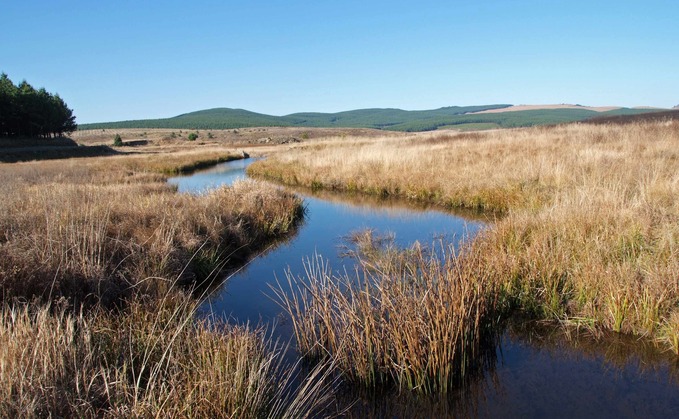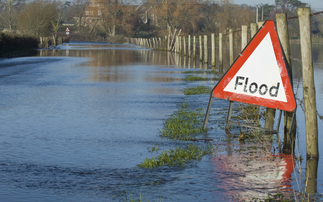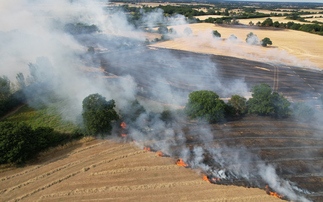
Partner Content: Evidence of a partnership-led approach has become essential for businesses looking to align their growth plans with sustainable goals - but what’s the right path?
The last of the UN Sustainable Development Goals is SDG17 'Partnership for the Goals' - an acknowledgement that the Global Goals can only be met if we all work together.
But it is easier said than done. Who should you collaborate with, for how long and what does it involve? How do you measure success and ensure that both sides of the arrangement get what they need out of it? We look at one successful partnership in South Africa, between the global packaging and paper group Mondi and WWF.
The collaboration has lasted two decades and emerged from an industry-wide initiative to conserve wetlands in South Africa, explains David Lindley, manager of the WWF-Mondi Water Stewardship Partnership at WWF South Africa.
"We are a very dry country and water is our biggest limiting factor. Wetlands are very important in managing water resources, but they were being affected in many cases by inappropriately managed plantation forestry, agriculture and other sectors," he says.
"Plantation forestry is the only crop in South Africa that is regulated by the government due to its declaration as a significant ‘stream flow reduction activity' and because of the water risk they present. We're predominantly a grassland country, not a forest country, therefore our indigenous vegetation uses much less water," Lindley adds. "And pulp mills use significant amounts of water as well."
Mondi recognises the critical importance of water stewardship and distinguishes between consumption and use.
|
Fact check |
|
Most wetlands in South Africa are not permanently flooded. They shrink during the dry season and expand in the wet season, so their boundaries move and can be difficult to delineate to the untrained eye. Furthermore, a buffer zone of 20 metres needed to be measured from the outer edge of the wetland through a delineation process. As a result, many wetlands and their buffer zones were being affected by agricultural and plantation forestry activities. WWF therefore started working at an industry level to ensure that the wetland and its buffer zones were correctly delineated and managed appropriately, explains Lindley.
"In 2001, at a meeting of all forestry company environmental managers, Mondi was the first company to stand up and say ‘we will help you to find a solution, and work to bring the plantation forestry industry along'," he says.
"As a significant landowner and an influential player in the South African forestry sector, Mondi had a lot of influence with other companies in the industry that we would not otherwise have access to," Lindley points out. "It was impossible for us to do what we are trying to achieve without partners."
Over time, the partnership expanded beyond the fence line to focus on broader landscape management and work with other stakeholders in agriculture, such as in the sugarcane and dairy sectors, as well as continuing to strengthen Mondi's water stewardship and management practices. The partnership between WWF and Mondi then evolved further to tackle shared forestry sustainability challenges around the world for example in Russia and Bulgaria.
"We work with other forestry companies and agriculture land uses as well as government, helping them to manage their water and land resources more effectively," he says. "We help them to understand that water is not just a critical business risk, but also a shared risk so that they need to work with their neighbours because water needs to be managed at a river catchment level.
"It's quite an undertaking because a lot of companies are only used to working within their own boundaries and it can be very difficult to get them to see beyond their traditional fencelines. That's what is so good about working with Mondi - they don't just focus on the catchment areas in South Africa where they have plantations and their mills. They look beyond their own operations and take a more holistic view at a landscape level. Mondi are helping WWF to strengthen freshwater stewardship for the greater good of the country. Not many corporate partners work in this way."
The relationship has not all been plain sailing, he stresses. "We have had our differences over the years. But like any healthy and mature partnership, we communicated and talked through the issues to resolve them."
There have also been times when WWF has had to ask some difficult questions of Mondi. "When you have a corporate partnership with a company, you have to balance it all the time in order to maintain your independence. Sometimes, you step over that line but it can be hard to see because it happens very gradually. Both partners need to see the benefits and respect the value each side brings."
Overall Lindley believes it has been a transformational partnership: "It has changed how Mondi thinks about water stewardship and it has changed how WWF thinks about working with corporates to manage water resources. We have both changed as a result of working together - that's real social change."
A key feature of this partnership is the relationship building that has developed through a long-standing partnership, and the level of trust and transparency that has been established. We can be really open and honest with each other, and for WWF-South Africa, this has been a stand out feature of the Mondi-WWF partnership. The maturity of this partnership has shown that by working collaboratively and openly, we can find the right answers together without compromising on our respective principles and values.
Putting a partnership into action in pulp and paper mills
As a member of the Alliance for Water Stewardship (AWS), Mondi aims to encourage and recognise good water management.
Working alongside the WWF, Mondi has integrated the AWS International Water Stewardship Standard (AWS Standard) into its 12 pulp and paper mills by introducing a pathway to establish water stewardship practices and standardise the way they are implemented across its mills.
This Group-wide water stewardship standard provides Mondi with a graduated and standardised approach for implementing water stewardship across its mills based on regular water risk assessments.
This article is sponsored by Mondi.







